My first time living in Berlin was in the summer of 2007 when I flew over to spend the summer to improve my German. My plan was to find a summer job in Berlin, which I failed at entirely. That was okay, though, because my rent in a one bedroom apartment was only 150 euros per month.
For a long time, this low cost of living coupled with the extraordinary array of nightclubs, squats, artist projects and off-the-wall tech companies attracted hoards of digital nomads to Berlin.
Tim Ferriss even listed Berlin in his famous “Four Hour Work Week” book as a perfect place for digital nomad “lifestyle” arbitrage: living in a low-cost country while earning in a high-wage country.
The prices have, like everywhere else in the world, risen in Berlin, but it still remains a great place to spend a few months as a digital nomad. These days you’ll find Berlin is still edgy, creative and alternative – full of exciting tech start-ups, new art exhibitions and countless meet ups with fellow digital nomads, remote workers and entrepreneurs.
As of right now, I can count about seven friends who are currently Berlin digital nomads that I met in at the KoHub coworking space in Koh Lanta, Thailand.
If you’re also thinking about checking out Berlin then read on as I’ll dig into everything you need to know about how you can spend a month as a digital nomad in Berlin in my Berlin Digital Nomad Guide.
Berlin Digital Nomad Guide
Pin me and help out another aspiring digital nomad! 🙂

What makes Berlin such a great digital nomad destination
Berlin is one of the best digital nomad destinations in the world because of the:
- Freelance visa options that support long-term legal stays
- More affordable cost of living – compared to other major Western European cities
- Thriving creative and tech scenes with a strong entrepreneurial spirit
- Plenty of coworking spaces and laptop-friendly cafés
- Diverse, international community that’s welcoming to newcomers
- Excellent public transport and bike-friendly infrastructure
- Rich history and edgy, artistic, creative atmosphere
- Diverse nightlife and cultural events
- Openness to alternative lifestyles
- Plus, it makes a great base for exploring Europe via budget flights and trains.
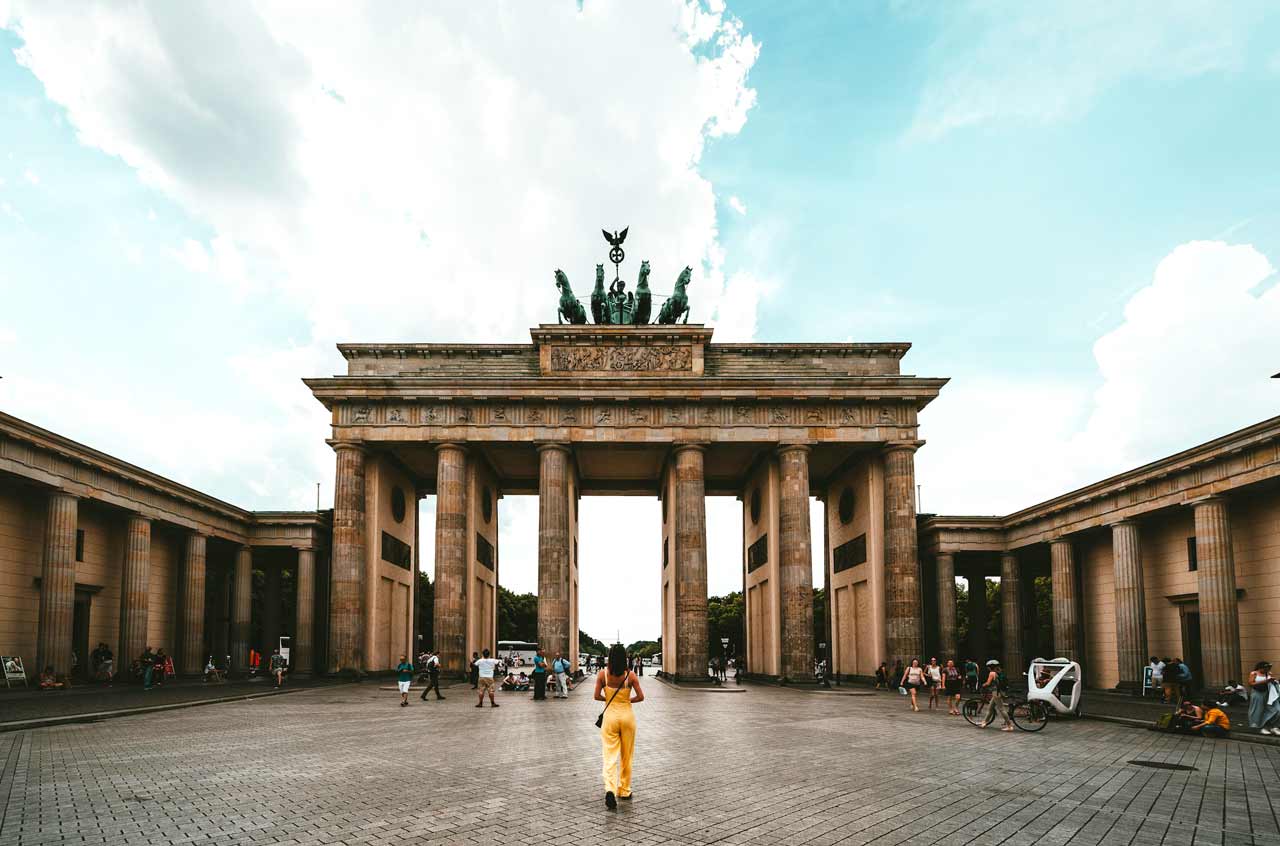
Cost of living in Berlin for digital nomads in 2025
The cost of living in Berlin used to be very low but prices have risen substantially, especially when it comes to housing, but it still remains cheaper than many other cities in Europe with groceries, eating out and transport being quite affordable.
I don’t want to go into this too much as it depends a lot on your lifestyle but what I will say is that while the cost of living in Berlin for a single person is around €1,500 to €2,000 you should be aware that it can be much higher for digital nomad staying in short term accommodation like Airbnb than for someone with a long term rental.
In fact, Nomads.com says the cost of living for a digital nomad in Berlin is $4,355 per month (which is like €3,400) but it’s still in the top 10 digital nomad destinations globally. More details here.
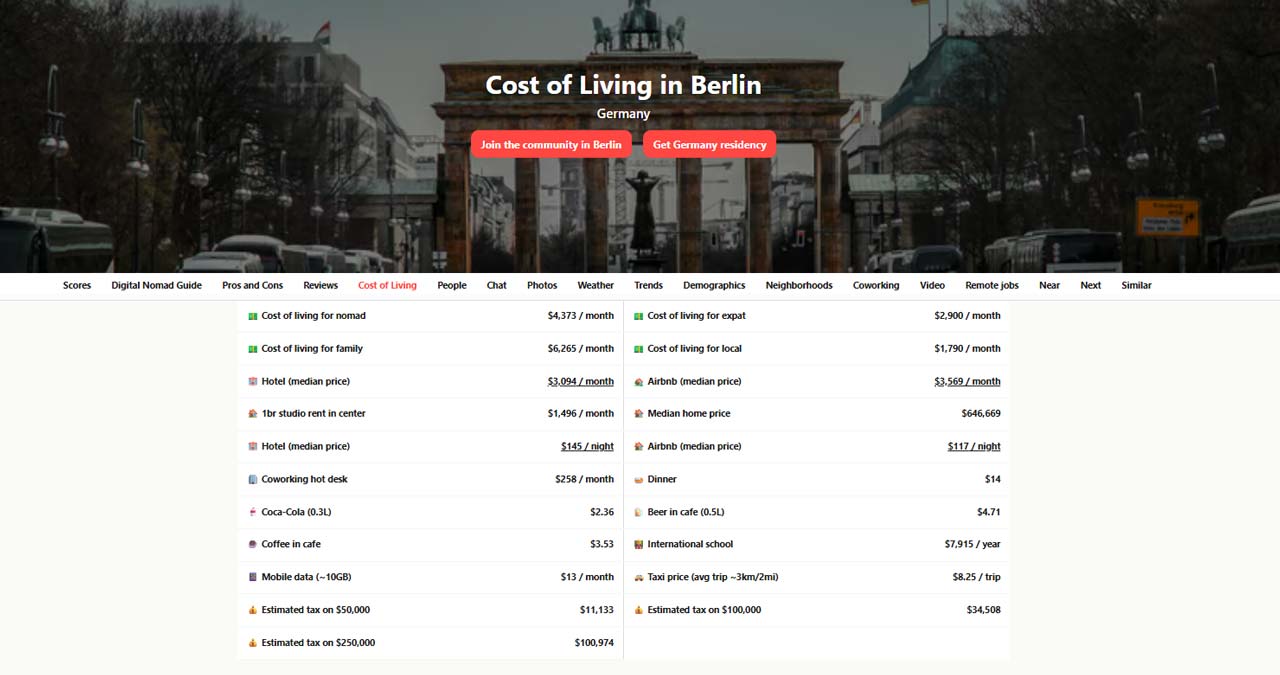
Another thing to budget for is travel and medical insurance but most travel insurance plans aren’t suitable for digital nomads or remote workers living abroad or traveling full time.
I use SafetyWing – they are the world’s first international travel medical insurance developed to meet the needs of digital nomads, remote workers and entrepreneurs worldwide.
SafetyWing offer two plans both aimed at digital nomads, so you choose depending on your needs and your budget. The Nomad Insurance Essential Plan is a travel medical insurance covering unexpected injuries and illnesses, including hospital visits, doctors fees, and emergency medical evacuations, while the Nomad Insurance Complete Plan is a full global health insurance option covering both travel related emergencies and preventative and routine care, serious conditions such as cancer, support for mental health, maternity care and more.
Digital nomad accommodation in Berlin
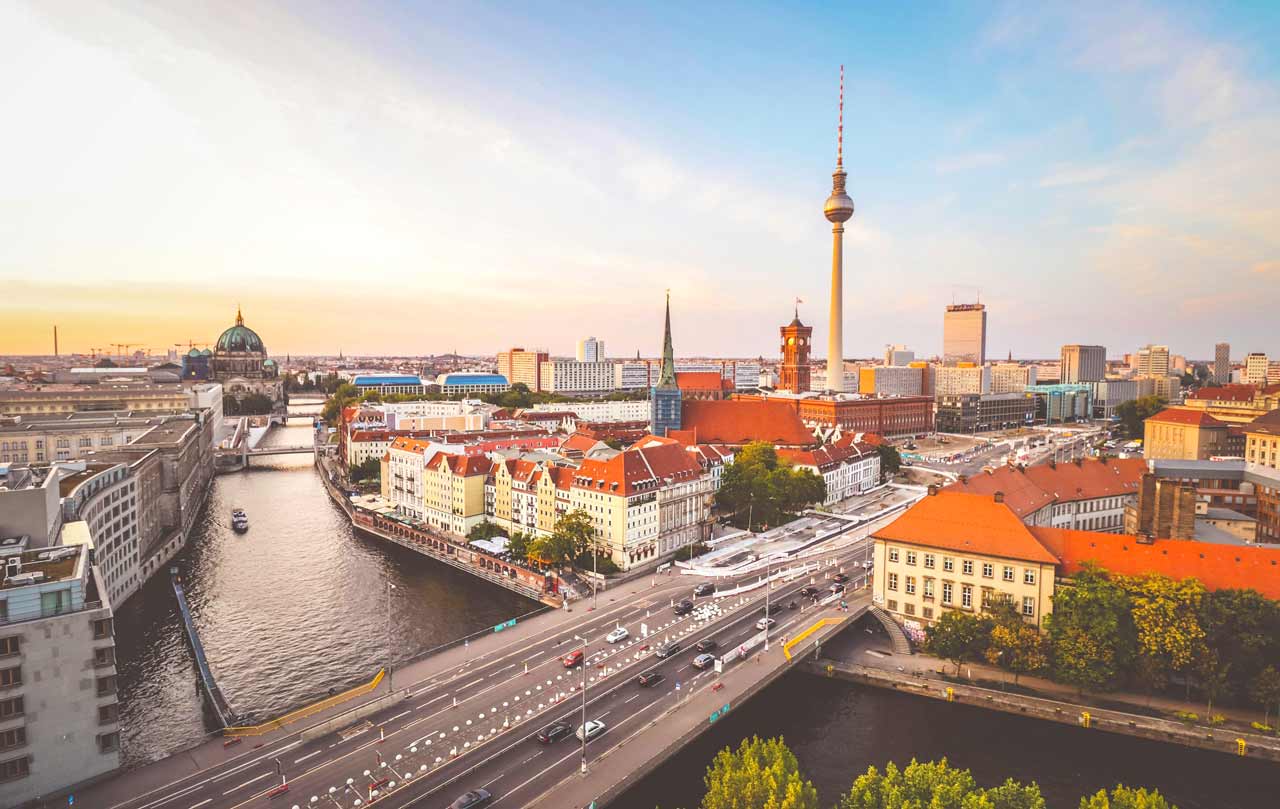
Accommodation is going to be your biggest expense in Berlin. When I first arrived in Berlin in 2008, I actually found a short-term furnished let via a real estate agent of all things.
Berlin’s days of cheap accommodation are long gone – nowadays, long term accommodation in Berlin is more expensive and more difficult to find, so I recommend booking a hostel or hotel online for at least a week when you first arrive while you get to know the different areas of the city, get registered and look for something more long term.
Neighbourhoods popular with digital nomads in Berlin include Neuköln, Kreuzberg or Friedrichshain. Prenzlauer Berg, Mitte and Charlottenburg are also popular, although they’re both more expensive these days. Also, Wedding is a good neighbourhood if you’re on a budget, as it’s situated just north of Prenzlauer Berg on the city ring light train line. More info about the different neighbourhoods in Berlin here.
Best Hostels for Digital Nomads in Berlin
Often it’s best to book your first week as a digital nomad in Berlin in a hostel which gives you an affordable base from which to explore the city, meet new people and find an apartment.
There are numerous backpacker hostels in Berlin but here’s some of the best hostels for digital nomads in Berlin:
- The Circus Hostel – One of Berlin’s most popular and highly rated hostels now has three houses (a hostel, hotel and apartments) that are ideal for digital nomads and remote workers. Circus hostel is in a great location, only 50 yards from Rosentalerplatz U Bahn Station, so it’s close to everything and both shared dormitories and private rooms with super fast WiFi and dedicated work areas are available. They also have studios and apartments with a coworking cafe and meeting rooms. The friendly staff can even offer support with dealing with the infamous German bureaucracy!
- Heart of Gold Hostel – in a central location in Mitte close to the Central Station, museum island and main sights. There’s a sociable vibe with plenty of activities going on and comfy common areas for working or socialising, including a bar downstairs. They have private rooms (including single rooms) and dorms and a nice courtyard garden.
- Generator Berlin Mitte – Super cool and modern hostel with a colourful, funky and minimalist interior design and a sociable bar. They also have a hostel in Prenzlauer Berg.
- A&O Hostels – A big chain of hostels with several locations around Berlin, including Friedrichshain, Mitte and one just 5 mins walk from the Central Train Station. They are clean, well equipped hostels but they are really big so have less character. On the plus side, they usually have free spaces even during busy times and are super cheap.
Coliving for Digital Nomads in Berlin
Coliving spaces are ideal for digital nomads who are new to a city and want to meet like minded people while keeping costs down.
Colivings usually include private bedrooms or dorms, fully equipped shared kitchens, and coworking spaces and social areas and events. So you have all the facilities you need to get work done while also making it easy to meet other digital nomads.
A great place to find convenient, hassle free, flexible digital nomad accommodation and coliving spaces in Berlin is on Coliving.com. They have sociable coliving spaces and fabulous fully furnished shared and private apartments set up especially with remote workers in mind, not only in Berlin, but all over the world and are usually cheaper than Air BnB – a private room in a shared coliving apartment starts at just 650 Euros a month.
The benefit of getting a coliving space over trying to rent an regular apartment by yourself is that it’s flexible meaning you can live month-to-month in most cities (although many colivings in Berlin do ask for a minimum stay of 3 months) city. It’s easy to find and apply for apartments online and there’s no hassle as the properties are fully furnished and ready to move in to and are all inclusive as utilities, WiFi and often weekly cleaning are included too.
Airbnbs for Digital Nomads in Berlin
Airbnb is the most hassle-free way for Berlin digital nomads to get an apartment if you’re staying for a few days to a few weeks. It’s far from the cheapest option, but if you stay for a month some hosts offer a monthly discount.
Airbnb has had some troubles in the last couple of years, as Berlin clamps down on illegal holiday rentals. Now, there are tough restrictions on short-term rentals, so it’s harder to find places to rent than before, plus rentals have gone way up in cost.
For example, a 1-bedroom flat in one of the trendier neighborhoods starts at $1500 for one month and quickly rises from there with short term lets being more expensive – typical prices per month for an Airbnb in Berlin is $2,500 – $4,000 per month. A room in a shared flat on Airbnb is cheaper, with Airbnb saying that the average price per month was $1418 USD.
Other options for accommodation in Berlin that are worth checking out include Nestpick, 9Flats, or Wimdu. You can also find apartments/ aparthotels ideal for digital nomads and remote workers on sites like Booking.com that are ideal for short term stays or while you look for a longer term place.
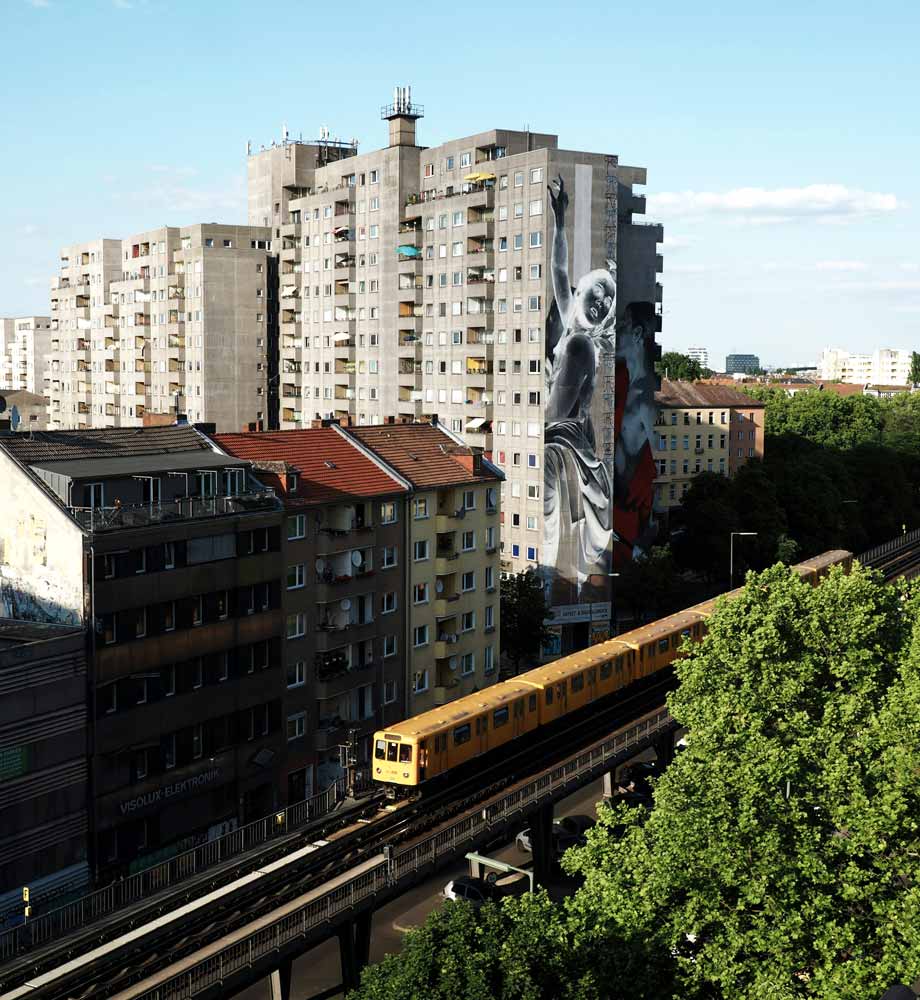
Sublets for Digital Nomads in Berlin
Airbnb rates might well be outside of your budget so it pays to do a little work on lesser known websites such as WG-Gesucht.de.
On these websites, you’ll find lots of students who rent out their room in a shared flat from anywhere from a couple of weeks to a year. Typically, they are doing an exchange year or an internship abroad, but they don’t want to give up their flat.
Therefore, you can often sublet their room for anywhere from 300 – 600 dollars/month in prime locations, which is far cheaper than Airbnb.
The informal nature of these sub-lets means that they’ll need to have a lot of trust in you, so the more information they have about you, the better.
I’ve found that you’ll have the most chances of success if you send over a link to your Facebook profile, personal blog, and give them a good sense of who you are in your email. I usually also sent a link to my Airbnb references, as well.
Be warned, however, that some Berlin sub-lets will hold a “casting” session to see who should get the room. My first time at a casting session was quite weird: I had to sit in a circle of about ten other interested people as we all introduced ourselves and what we were about.
One of the other people introduced himself as a DJ who was just back from Nepal where he’d helped out at a children’s orphanage. He seemed so cool even I felt he should get it!
It’s also harder to rent one of these rooms if you’re not already in Berlin, so plan a week stay in a hostel or hotel while you’re looking.
Long Term Rentals for Digital Nomads in Berlin
The market for longer term rents in Berlin is quite competitive, as thousands of new people move here every year. Consequently, apartments have become scarce on the ground and you’ll need a lot of paperwork to get one.
Tenants enjoy excellent protections under German law, so landlords tend to have quite exacting standards for renting out apartments in terms of credit rating, a full-time job and evidence of paying the rent in the past. In addition, apartments often come entirely unfurnished right down to the light fittings and without any kitchen.
For these reasons, I don’t recommend looking for longer term rentals in Berlin if you are a digital nomad only planning on staying a few months at most. And be careful of scams – don’t send any money for something you saw on Facebook marketplace before you arrive – generally, anyone who wants you send money sight unseen due to “being out of the country right now” shouldn’t be trusted.
When I moved back to Berlin in 2015, I rented a place on Airbnb for a month before subletting an apartment for 1 year from a couple who moved abroad before finally getting my own long term rent once I had all the extensive paperwork required.
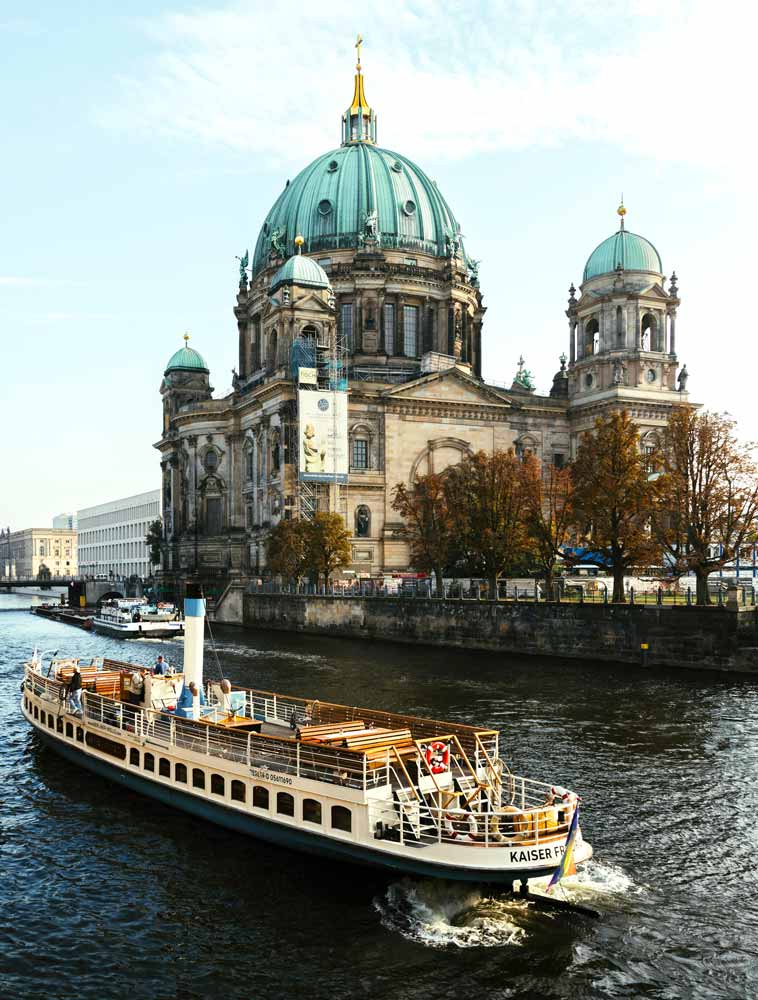
Digital Nomad Visas for Germany
As Germany is part of the Schengen agreement, citizens of other Schengen member states can travel, stay and work visa free throughout the whole territory.
Depending on which country your passport is from you might need to apply for a Schengen Visa to enter Germany although, if you’re from the UK, USA, Canada, Australia, New Zealand, then you don’t need a visa to stay in Germany for up to 90 days within a 180 day period.
If you want to stay longer, while there currently isn’t a digital nomad visa for Germany, there is a special Freelance Visa (Freiberufler) which allows non-EU citizens to live in Berlin legally while working remotely or freelancing in specific professions.
You’ll need to show that your work is in demand and that you can support yourself financially, but once you’re approved, it’s one of the more stable and long-term-friendly options in Europe. This is one of the reasons there are so many digital nomads in Berlin.
There’s also the Self-Employment Visa (Selbständiger) for entrepreneurs and business founders who want to start a company in Germany. However, getting the paperwork correct to run a location independent business in Germany can be difficult.
In order to start a business here, one must go through heaps of paperwork, physically go to different government offices and later face complicated taxation procedures. Luckily there’s help available – Xolo was created to help digital nomads and freelancers to start their location independent businesses.
Where do Digital Nomads Work in Berlin?
Unlike more expensive cities such as Paris or London, it’s easy to find inexpensive co-working spaces and highly tolerant cafes in Berlin to work from.
Best Cafes in Berlin to Work From
Of course there are many, many cafes in Berlin, but there are some that are especially good for digital nomads to work from. Here’s a few of my favourite digital nomad cafes in Berlin.
The St Oberholz cafe in Mitte is famous as the birthplace of the audio-streaming giant SoundCloud. You can hang out there amongst the creative set working on your laptop, as long as you occasionally order a coffee.
My personal cafe to hang out at is Szimpla on Boxhagner Platz. Other favourites include:
Coworking Spaces in Berlin

The Betahaus Co-Working Space
Credit: Tim Pritlove licensed under CC BY 2.0
Berlin has no shortage of coworking spaces. Conveniently, you can often buy day passes or monthly passes which will suit digital nomads staying for a shorter period of time.
The most famous coworking space in Berlin is Betahaus in Kreuzberg. It combines a great cafe on the ground floor with hackerspaces and a coworking space on the upper floors. I’d recommend just working out of the ground-floor cafe, as you’ll meet more people there.
The Factory up in Prenzlauer Berg is a Google-backed startup space and innovation community that has over 800 people working out it, including companies such as Uber, Twitter, and SoundCloud.
Other options include the Co-Up coworking space in Kreuzberg that hosts almost daily tech meetups in the evening, or the quieter Launch/co in Friedrichshain, famous for the first coworking space in Europe to accept Bitcoins.
Things to do in Berlin
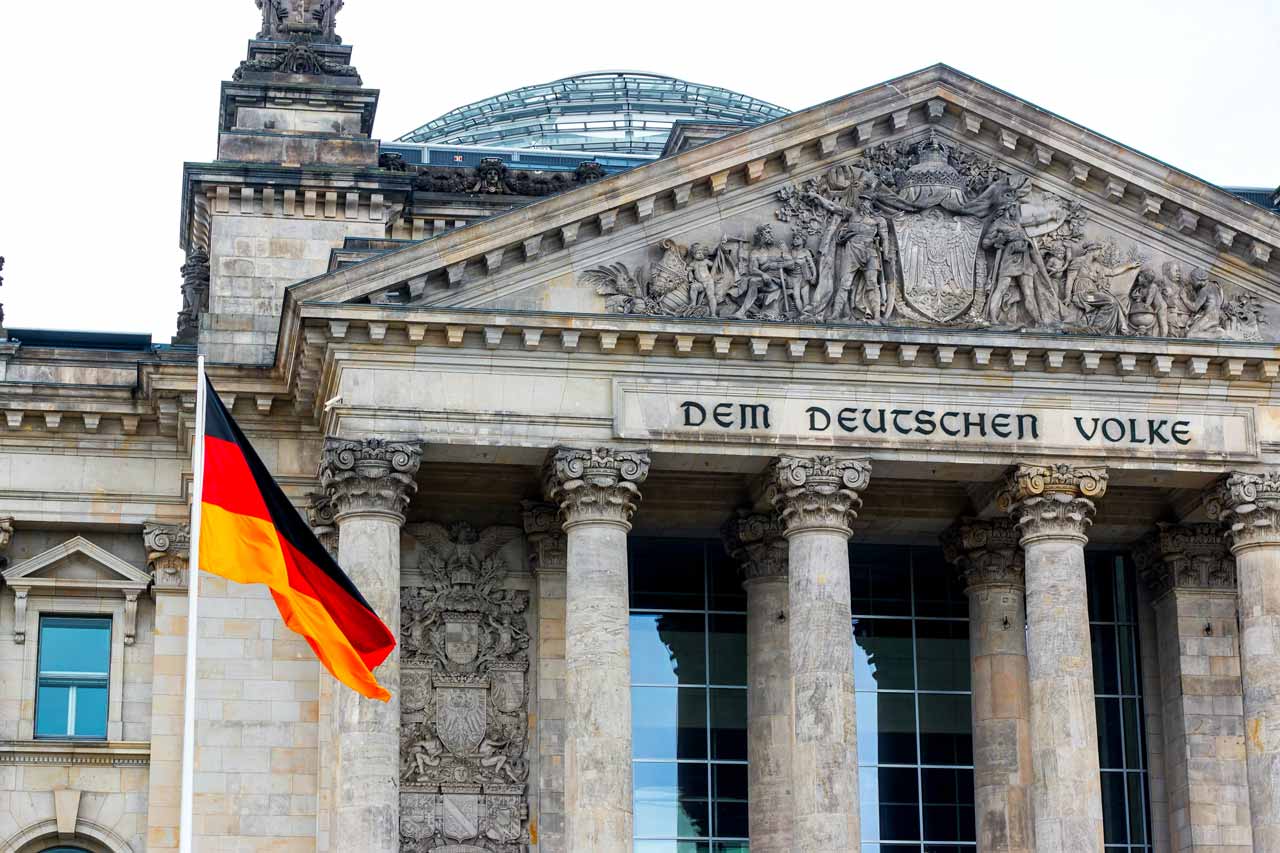
Understand Berlin’s History
Berlin is a city that has played a huge part in much of recent history witnessing the rise of Adolf Hitler, 2 world wars and being divided during the cold war. It’s a city that is constantly rebuilding and reinventing itself which is part of what gives it such a unique vibe.
If you’d like to understand Berlin’s history while checking out some of the city’s famous landmarks like the Berlin Wall, Brandenburg Gate, the Holocaust Memorial, the Reichstag and Checkpoint Charlie, the best way to do this is by joining a walking tour like this one – Third Reich and Cold War Walking Tour.
And of course, another sobering yet important site to visit just outside the city is Sachsenhausen Concentration Camp. I think it’s really important to understand how these horrific things happened so that we can stop it from happening again. You can take a guided tour of Sachsenhausen Concentration Camp which includes transport from Berlin.
War history aside, Berlin nowadays is a vast playground from the chic neighborhoods to the more gritty, urban sectors to more sleepy suburbs. There’re lots of places to explore, here are some of my personal recommendations for the best things to do in Berlin for digital nomads.
RAW Gelände

Graffiti in the RAW Gelände
Credit: Guillén Pérez under CC BY-ND 2.0
RAW is one of the coolest places to hang out in Berlin. This long stretch of industrial buildings was once a train repair station but now has turned into an eclectic mix of clubs, skateboarding parks, gourmet food trucks, and flea markets.
Every evening at 9:30 pm in the summer you can catch a film at the outdoor cinema at Cassiopeia. On Sunday you’ll find a second-hand, open air flea market. You’ll even find a Vegas-style day club nestling amongst the graffitied industrial factory buildings.
Teufelsberg

Teufelsberg
Credit: Matt Biddulph licensed under CC BY-SA 2.0
Teufelsberg, or Devil’s Mountain in English, is home to a former US espionage station during the Cold War. Now, it’s a magnet for graffiti artists. The 80 meter climb up is rewarded with views of Berlin to one side and the Brandenburg countryside to the other. It’s also a nice day trip for hiking or mountain biking, as it’s one of the few hills in Berlin.
Markthalle Neun

The Thursday Night Food Market at Markhalle Neun
Credit: Alper Çuğun licensed under CC BY 2.0
Foodies will love the various markets held in the Markthalle Neun building. Every day from Tuesdays to Thursdays it’s a regular grocery market with vegetables, meat, and speciality gro. On Thursday evening, however, it’s transformed into a street food market with food from all over the world.
My personal favourite is the Breakfast Market held every third Sunday in the month. Berliners don’t like getting up very early, so it’s open until 5 pm in the evening.
Tempelhof Airport

Walking down the abandoned runway!
Credit: Andrey Belenko licensed under CC BY 2.0
Tempelhof Airport was crucial in resupplying Berlin during the Berlin Blockade right after the Second World War. Now, the airport has been shut down and turned into one gigantic park. You can longboard down the runways or sunbathe on the grassy areas in between. It’s perfect for a picnic or BBQ in the summer.
Meetups to Meet Fellow Digital Nomads in Berlin
The Berlin digital nomad scene is full of so many meet ups it can be hard to keep track of them: from cryptocurrency meetups with the co-founder of Ethereum to Couch Surfing meetups with backpackers from around the world or co-working sessions designed to help you stay productive, there’s many ways to meet locals and other digital nomads in Berlin.
I keep an eye out on Meetup.com for interesting professional events. Couchsurfing events are also great for meeting people who are into backpacking, music, and arts. There are multiple CouchSurfing events every week, including an Ultimate Frisbee game every Saturday in Treptower Park. Otherwise, Eventbrite can be a great source of interesting events and Facebook groups can help you connect with other digital nomads.
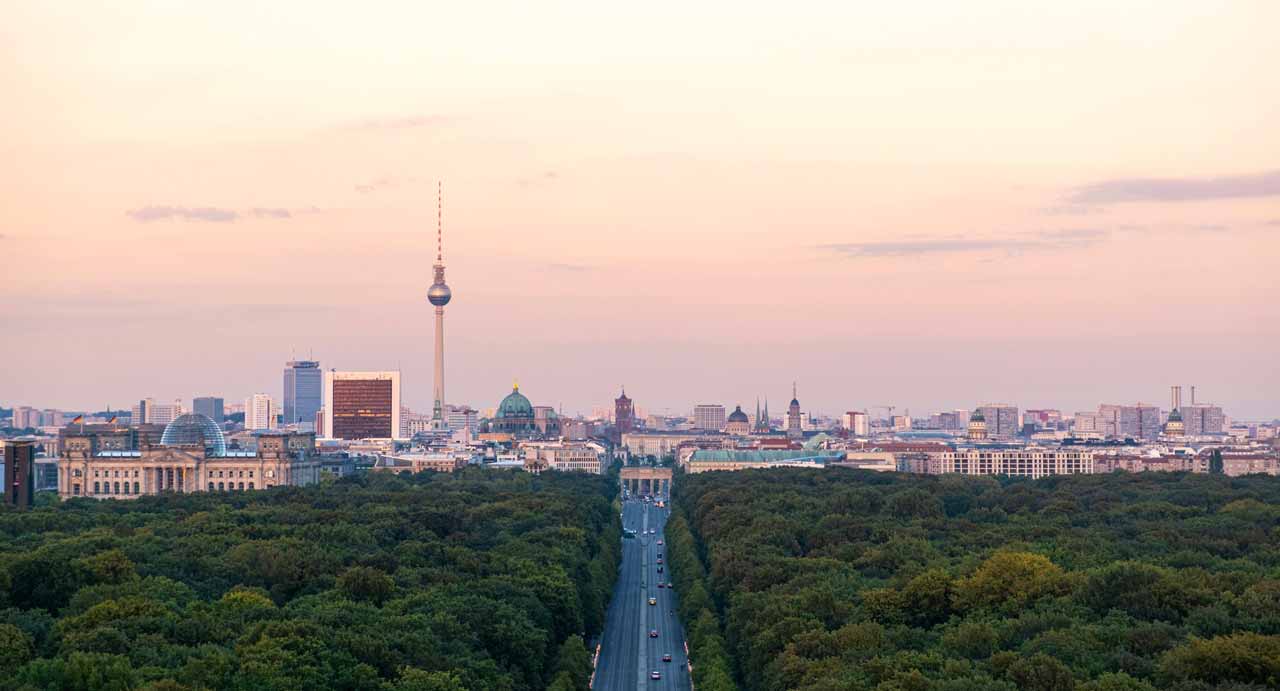
How to Stay Longer in Berlin
Like many other digital nomads you might end up falling in love with Berlin and decide to stay longer term.
The good news is that getting a work visa for non-EU citizens in Berlin is not too difficult. You can apply for an artistic/ freelancer visa if you’re planning on working in the arts without any full-time job and this is a route many digital nomads in Berlin take.
On the other hand, Berlin was notorious in the past for high unemployment rates and low wages to go along with the cheap cost of living. That’s changing, as the German economy has been booming for years now and, thanks to the large tech industry, people with tech, product design or marketing skills won’t find it too difficult to find jobs that don’t require German fluency. You’ll find many of the jobs advertised on Berlin Startup Jobs.
Most people in Berlin speak good English but if you want to stay longer in Berlin then learning German will make your day-to-day life so much easier, as you won’t have to ask a German friend to accompany you on every small administrative task. You’ll find that Berlin life comes with its fair share of bureaucracy from endless queues to register your address to paying various taxes and fees or filing tax returns. You’ll find plenty of options for German courses, including public subsidized beginner courses starting at roughly $2/class.
Otherwise, Reddit is a fantastic resource for learning more about living in Berlin. The Berlin sub-reddit has a great wiki with answers to almost anything you could want to know. And if not, there’s quite a friendly community who are happy to answer questions not answered in the wiki.
So that’s it for my digital nomad guide to Berlin – I hope you found it useful and fall in love with the city as much as I have.
If you want more ideas for ways to make money as a digital nomad check out my interview series with all kinds of digital nomads. And if you’re also considering Portugal check out this digital nomad guide to Lisbon.
Pin Me 🙂

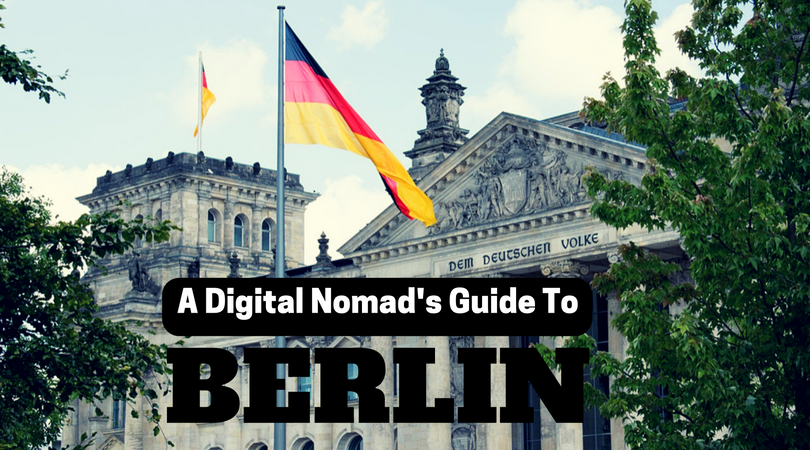
8 comments
Hopefully I’ll get to join the party soon one day.
Yeah Berlin is awesome 😊
Your blog is very informative and I am learning so much stuff from here.
Thank you so much.
Awesome stuff
The how to stay longer” was my favorite part. After reading this I’m definitely staying longer.
Cool! Enjoy Berlin 🙂
Hi Anna, great post! We are a relocation company helping people move to Berlin, perhaps your readers would be interested in our programmes http://www.nomadenberlin.com 🙂
Great post! Very helpful